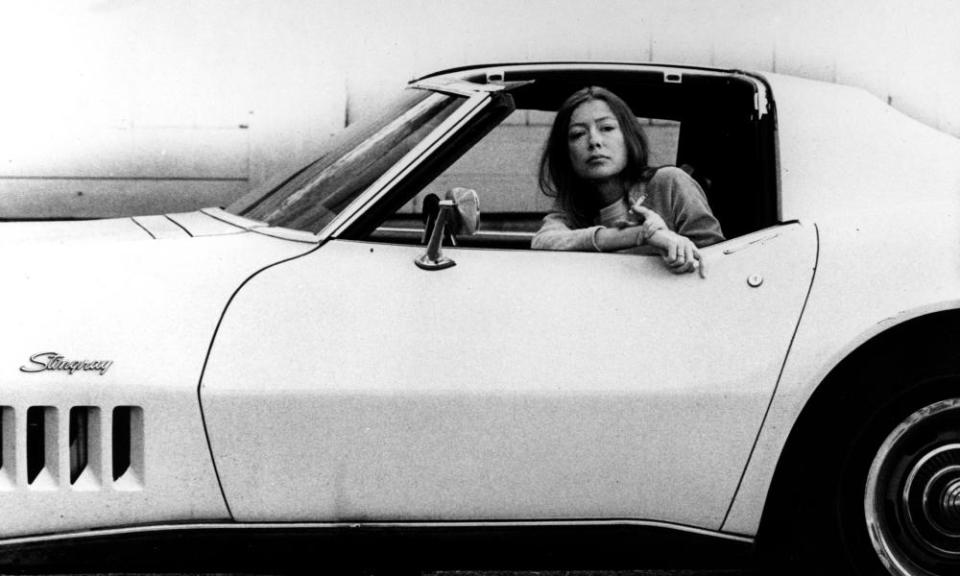Janet Malcolm: The Last Interview; Joan Didion: The Last Interview review – crafty to the end

Writing, as Janet Malcolm once declared, ought to be an “invisible, odourless calling”. Now, however, publicists and marketers push artists to be visible, voluble and, if possible, sweet-smelling. Hence the anthologies of chat in the Last Interview series, which extend from the self-elucidation of sages such as Jacques Derrida and Hannah Arendt to the bizarre dicta of Prince and the befogged ramblings of Billie Holiday, one of whose interviews is conducted by the cops after a drug bust.
To qualify for inclusion in the series you need to be dead, and while alive you must have had celebrity status: artistic achievement alone doesn’t make the grade. Janet Malcolm earned her place because of the fights she famously picked. In a case that kept the courts busy for an entire decade, she was twice sued for libel by a psychoanalyst whom she called, in her book on the Freud archives, “an intellectual gigolo”. Finally exonerated, Malcolm had no regrets: “the freedom to be cruel”, she believed, “is one of journalism’s uncontested privileges”, and in describing her apartment to an interviewer she pointed approvingly to the patches on a sofa that her cat had “viciously clawed”.
Joan Didion, never as eager for controversy as Malcolm, owed her public renown in part to her modish accessories. While living in Malibu and working as a Hollywood screenwriter, she cruised along the Pacific coast highway in a canary-coloured Corvette, a gaudy vehicle she shared with the heroine of her novel Play It As It Lays; later, aged 80 and looking painfully vulnerable behind her owlish shades, she consented to become the face of the French fashion brand Céline.
To disarm subjects, Malcolm adopted what she called a ‘Japanese technique’, giggling like a geisha flattering a businessman
Didion’s interviewers remark on her pallid frailty, but they also notice the prehensile strength of her hands and the intensity of her blue-eyed gaze. This small, shrinking woman outfaced danger during her stint as a war reporter in El Salvador, and in The Year of Magical Thinking, written after the sudden death of her husband, she rawly exposed the sentimental self-deceptions of bereavement. With the same innate toughness, she defies interviewers who want to probe her professional secrets. “I don’t know,” she shrugs when asked about existential leaps in her novels, after which she more candidly adds: “It’s nothing I want to examine too closely.” The long-breathed sentences in her essays assemble dizzy pyramids of subordinate clauses; by contrast, Didion’s talk is fragmentary, punctuated by evasive lapses into silence. “She is not a virtuoso conversationalist,” sighs an interviewer who tapes her for four hours, then finds that half the footage consists of pauses.
Malcolm, a scarier character, engages in tugs of war with interviewers and her own interviewees. “She did not like the impromptu or spontaneous,” says an outmanoeuvred journalist after being refused permission to record their conversation. Malcolm only agreed to be questioned by the Paris Review if allowed to respond by email whenever she felt ready. Her excuse for this premeditation was that speech is sloppy and imprecise, “full of uhs and ahs”. More sneakily, she extended the same courtesy to the people she interviewed for her investigative articles: she touched up their phrasing, and when they objected to her interpolations she said that she had merely “curated” their responses.

To disarm the subjects she interrogated, Malcolm adopted what she called a “Japanese technique”, deferentially giggling like a geisha flattering a businessman in a bar. Didion, genuinely shy but also shrewd, relied on a similar subterfuge. On magazine assignments, she asked desultory questions as an excuse for being allowed to hang around and watch events unfold, but she took no notice of what was said to her. The interview format, she tells a flailing hack, is not to be trusted, and anyway people always lie.
As their ultimate triumph, these crafty women decline to utter famous last words when giving their last interviews. “I had not totally absorbed the idea of her as ordinarily mortal,” Malcolm’s admirer Katie Roiphe testified after her heroine’s death. Malcolm, suffering from lung cancer, had no such illusions. Asked at the end of the volume about the items on her bedside table, she tallies a Kleenex and a cough drop rather than a pile of consoling classics. A few months before her death from Parkinson’s disease, Didion “indulged Time in a few questions” to promote her final collection of essays; her replies are eloquently exasperated despite their terseness. Prompted to address people bereaved during the first year of Covid, she has nothing to say. When asked whether she has hope, she retorts: “Hope for what?” The desperate journalist wonders if she fears death. “No,” insists Didion, then immediately contradicts herself: “Well, yes, of course.”
The dumb, bumbling questions deserve such dismissive treatment: writers are not oracles who relay messages from the gods. Our last inquisitions are conducted posthumously, and no transcripts of those fateful, soul-baring sessions with the recording angel have ever been published.
• Janet Malcolm: The Last Interview and Other Conversations is published by Melville House (£12.99). To support the Guardian and Observer order your copy at guardianbookshop.com. Delivery charges may apply
• Joan Didion: The Last Interview and Other Conversations is published by Melville House (£12.99). To support the Guardian and Observer order your copy at guardianbookshop.com. Delivery charges may apply

 Yahoo Sports
Yahoo Sports 